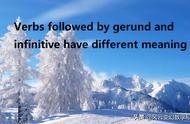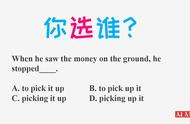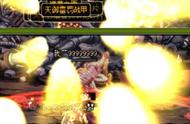
01
Unit 1
How can we become good learners?
1.By asking the teacher for help. 通过向老师求助。
注:这里by表示“通过某种方式、手段”,后面要加名词、代词或动词-ing。
2.What about reading aloud to practice pronunciation? 大声读出来练习发音呢?
注:What about...?表示“……怎么样”,后面直接接名词或动词-ing,这里可以与 How about互换,两者用法一样。
3. It’s too hard to understand spoken English. 听懂英语口语太难了。
注:①it is 形容词( for sb) to do sth是个固定句型,表示“(对某人来说)做某事……(简单/难……)。It是个形式主语,其实真正的主语是后面的动词不定式短语。②too...to...表示“太……而不能……”,需要注意的是句子是肯定形式,但表示的是否定的意思。
4. The more you read, the faster you’ll be. 你读的越多,你阅读的速度就越快。
注:“the 比较级...,the 比较级...”是固定用法,表示意为“越……,越……”,这里前后两个比较级是不同的词。注意区别类似结构比较级 and 比较级,表示”越来越……“,其中两个比较级是同一个词,表示程度的加深。如The weather becomes colder and colder.
5. I want to learn new words and more grammar so that I can have a better understanding of English movies. 我想学习新单词和更多的语法,以便更好地理解英文电影。
注:so that引导目的状语从句,表示“以便,为了”,相当于in order that结构。它后面的从句中谓语动词常包含can、may等情态动词。
6. I don’t know how to increase my reading speed.我不知道如何提高我的阅读速度。
注:how to increase my reading speed是“疑问词 to do”结构,在句中作know的宾语。疑问词what、who、which、when、where、how、why等可以与to do一起构成“疑问词 to do”结构,在句中作主语、宾语、表语或宾补等成分。
7. But whether or not you can do this well depend on your learning habits.但是你是否能学好取决于你的学习习惯。
注:whether or not you can do this well 是由whether引导的主语从句。当whether 与or not连用表“是否”时,whether不能用if替换。
8. Even if you learn something well, you will forget it unless you use it.即使是你学得好的东西,如果你不使用,就会忘记。
注:①even if表示“即使,尽管”,引导让步状语从句,有退一步的意味。②unless表示“除非”,引导条件状语从句,相当于if...not。
02
Unit 2
I think that mooncakes are delicious!
1. What a great day it is! 多么美好的一天啊!
注:这是一个由what引导的感叹句,相当于How great today is! 注意what用于感叹句,后面强调的落脚点一定是名词;而how用于感叹句时,后面强调的一定是形容词或副词。
2.Chinese people have been celebrating Mid-Autumn Festival and enjoying mooncakes for centuries. 中国人赏月欢度中秋已经有几个世纪了。
注:这句话中用了现在完成进行时,即has/have been doing for centuries,表示动作到现在一直持续进行并将继续下去。
3. Whoever drank this could live forever, and Hou Yi planned to drink it with Chang’e. 谁喝了这个就可以永生,后羿就打算和嫦娥一起喝它。
注:whoever在这里是连接代词,引导名词性从句,表示“任何一个……的人”,相当于anyone who。
4. But behind all these things lies the true meaning of Christmas: the importance of...但在这一切事情的背后存在着圣诞节的真谛:……
注:这是一个倒装句。句子的主语是the true meaning of Christmas...,由于主语太长,为避免头重脚轻,所以把主语放在了后面,这时谓语动词要与后面的主语在人称和数上保持一致,主语是短语时看做一个整体是单数,谓语用第三人称单数形式lies。
5. Not only do people spread them around in different hiding places for an egg hunt, but they also give out these treats as gifts.人们不仅为了寻找复活节彩蛋游戏而将彩蛋分散到周围不同的藏匿处,而且他们还分发这些好吃的作为礼物。
注:not only...but also...表示“不但……而且……”。当它前后连接两个句子时,not only后的句子要倒装,但but also后的分句不用倒装。
02
Unit 3
Could you please tell me where the restrooms are?
1.Could you please tell me where the restrooms are? 你能告诉我洗手间在哪里吗?
注:① “Could you please 动词原形 其他?”表示“请你……,好吗?”,常用来有礼貌地请求对方做某事,这里的could不是can的过去式,而是用来表达委婉的语气。②“where the restroom are”是由where引导的宾语从句,在句中作tell的宾语。注意宾语从句必须用陈述句语序。
2.Could you please tell me how to get to the bookstore? 你能告诉我怎么去书店吗?
注:特殊疑问词how和动词不定式连用,在句中作tell的宾语。“疑问词 to do”结构常放在tell, show, teach, learn, know, wonder, forget, choose等动词之后作宾语。
3.Excuse me, would you mind telling me how I can get to a nearby restaurant?打扰一下,请问你能否告诉我怎么去附近的餐馆?
注:Would you mind...?用来表示委婉的请求或用来表示希望得到对方的许可,mind后接动词-ing。
4.I was scared at first, but shouting did help. 我一开始很害怕,但喊叫的确起作用。
注:英语中,可用助动词do对谓语动词进行强调。如果句子是过去时,助动词也要用对应的过去式did,后面的谓语动词用原形。。
04
Unit 4
I used to be afraid of the dark.
1. I used to be afraid of the dark. 我过去常常害怕黑暗。
注:used to do表示“过去常常做某事(现在已经不做了)”,to是动词不定式符号,后面接动词原形。要注意它与be/get used to doing的区别,后者表示“习惯于做某事”,其中的to是介词,后面接名词或动词-ing。
2.I go to sleep with my bedroom light on. 我开着卧室的灯睡觉。
注:with my bedroom light on是介词短语,在句中作伴随状语。
3.Now she’s not shy anymore and loves singing in front of crowds. 现在她不再害羞,喜欢在公众面前唱歌。
注:not...anymore意为“不再”,相当于no more。前半句也可以改为She is no more shy。
4.Only a very small number of people make it to the top.只有很少的人能出人头地。
注:a number of表示“许多”,后面接复数可数名词,作主语时,中心词是后面的复数名词,因此句子的谓语动词也要与复数名词保持一致。number前可以用small, large等修饰,表示程度。
05
Unit 5
What are the shirts made of?
1.What is the model plane made of? 这个飞机模型是用什么制造的?
What is the painting made from? 这幅画是什么制成的?
注:be made of和be made from都表示“由……制成”,区别在于用of表示可以看出制作的原材料,而用from则表示无法看出原材料。
2.Tea plants are grown on the sides of mountains 茶叶被种在山坡上。
注:这句是一般现在时的被动语态,即主语tea plants是谓语动词grow的承受者(grow tea plants)。被动语态的结构是“主语 be 及物动词的过去分词( by sb)”,一般现在时的被动语态be动词用is/are。
3.No matter what you may buy, you might think those products were made in those countries. 无论你买什么,你可能都会认为它们是在那些国家制造的。
注:“no matter 特殊疑问词”表示“无论……”,一般用于引导让步状语从句,相当于“特殊疑问词 -ever”。
4.It takes several weeks to complete everything. 完成所有的一切需要几周时间。
注:“It takes (sb) 时间段 to do”表示“做某事要花费(某人)……(时间)”。It在句中是形式主语,真正的主语是后面的动词不定式短语。
06
Unit 6
When was it invented?
1. When was it invented? 它是什么时候发明的?
注:这句是一般过去时的被动语态。被动语态的时态变化只需要改变be动词的时态,过去分词不变。
2.It is said that a Chinese ruler called Shen Nong first discovered tea as a drink.据说中国的一位名为神农的统治者最早发现茶可以作为一种饮品。
注:It is said that...表示“据说,有人说”。类似结构还有“Itis believed/known/reported… that从句”。
3.In England, tea didn’t appear until around 1660, but less than 100 years later, it had become the national drink.在英国,直到大约1660年才出现了茶,但是不到100年的时间,它已经成为了全国性的饮料。
注:not...until...示“直到……才……”,是用否定的形式表示肯定的意义。
4.At the same time, they need to stop the competing team from getting the ball into their own basket.同时,他们需要阻止对方把篮球投入他们自己的篮里。
注:stop sb from doing sth表示“阻止某人做某事“,相当于keep/prevent sb from doing sth。
5.The number of foreign players, including Chinese players, in the NBA has increased. NBA中包括中国球员在内的外国球员数量有所增加。
注:“the number of 名词复数“表示”……的数量”, 主语的中心词是the number,是单数,所以谓语动词用单数形式。要注意它与Unit 4中的a number of的区别。
07
Unit 7
Teenagers should be allowed to choose their own clothes.
1.I don’t think twelve-year-olds should be allowed to get their ears pierced. 我认为不应该允许12岁的孩子穿耳孔。
注:①这是一个包含情态动词should的被动语态。该类句型结构为“主语 情态动词 be done”。②当主句的主语是第一人称I或we,谓语动词是think, believe, suppose, guess等词时,后面的从句不能是含有not的否定句;若要否定,须将not提到主句。
2. Should I be allowed to make my own decisions? 我应该被允许自己做决定吗?
注:含有情态动词的被动语态,一般疑问句是将情态动词提到句首,其他不变。
3. Only then will I have a chance of achieving my dream. 只有这样我才能实现我的梦想。
注:only修饰状语且放在句首时,句子要半倒装,即把助动词/be动词/情态动词提到主语前面,其他部分不动。
4. They should be allowed to practice their hobbies as much as they want. 应该允许他们随心所欲地练习他们的爱好。
注:as much as they want是状语,修饰practice,而不是修饰hobbies。
08
Unit 8
It must belong to Carla.
1.It must belong to Carla.它肯定属于卡拉。
注:①must在这里表示可能性非常大的推测,可以译为“肯定,一定”。②belong to意为“属于”,后面一般跟人,没有进行时态,也不能用于被动语态。
2.—Whose book is this?这是谁的书?
—It is Tom’s/mine. 是汤姆的/我的。
注:“whose 名词”可以引导特殊疑问句,用来询问东西的主人,回答时,要用名词所有格或名词性物主代词。
3.I attended a concert yesterday, so it might still be in the music hall.我昨天去听了音乐会,因此它可能仍然还在音乐大厅里。
He could be running for exercise. 他可能是在跑步锻炼身体。
注:might,could也都可用于肯定推测,但在程度上有所区别。肯定推测时,上面的must表示的可能性最大,can/could次之,may/might可能性最小。
4.So it can’t be stolen.所以它不可能被人偷了。
注:can’t 在这里用于否定推测,语气比较强烈,可译为“不可能”。
5.I think somebody must have picked it up.我认为肯定有人已经捡走它了。
注:must have done是对过去发生的事情做肯定推测,表示“肯定已经……”。
09
Unit 9
I like music that I can dance to.
1.I love singers who write their own music.我喜欢自己创作曲子的歌手。
注:关系代词who引导的是一个限制性定语从句,修饰前面的singers,who在从句中作主语。
2.We prefer music that has great lyrics. 我们更喜欢歌词很棒的曲子。
注:①关系代词 that引导的定语从句修饰先行词music,that在从句中作主语,不可省略。另外,从句中的谓语动词单复数要与先行词保持一致。②prefer表示“更喜欢”,后面直接接名词。
3.I like music that I can dance to. 我喜欢那种可以跟着跳舞的音乐。
注:同上句一样,that引导的是定语从句修饰先行词music,但这里的that在从句中作宾语,可以省略。
4.In that case, I’ll ask someone who likes serious movies.如果那样,我会找个喜欢看严肃电影的人问问。
注:in that case意为“如果是那样的话”。另外需要注意先行词someone是单数,所以后面的定语从句谓语动词要用单数likes。
10
Unit 10
You’re supposed to shake hands.
1.In your country, what are you supposed to do when you meet someone for the first time?在你们国家,当你第一次见到某人的时候你应该做什么?
注:be supposed to do sth表示“ 被期望做某事,应该做某事”。
2. I met a Japanese boy called Sato, and as soon as I held out my hand, he bowed. 我遇到一个叫佐藤的日本男孩,我刚一伸出手,他就鞠了一躬。
注:as soon as表示“ 一……就……”,引导时间状语从句。
3.We often just walk around the town center, seeing as many of our friends as we can!我们经常只是在镇中心闲逛,尽可能多地见到我们的朋友!
注:as... as one can表示“ 尽可能……,尽量……”,相当于as ... as possible。
4.Also, we never visit a friend’s house without calling first.而且,我们从不会未通电话便拜访朋友家。
注:without calling first是介词短语,在这里作条件状语,相当于if we don’t call first。
5.Where I’m from, we’re pretty relaxed about time. 在我的家乡对时间是相当宽松的。
注:这里where引导的是一个地点状语从句。
11
Unit 11
Sad movies make me cry.
1.I’d rather go to Blue Ocean because I like to listen to quiet music while I’m eating. 我更愿意到蓝海洋餐厅,因为我喜欢在吃饭时听轻音乐。
注:I’d rather是I would rather的缩写形式,表示“宁愿,更喜欢”,后面跟动词原形。
2.But that music makes me sleepy. 但是那种音乐会让我昏昏欲睡。
注:“make sb. adj.”意为“使某人感到……; 使某人处于某种状态”。
3.The movie was so sad that it made Tina and Amy cry. 这部电影是如此悲伤,以致蒂娜和艾米都哭了。
注:so...that...表示“如此……以致……”,that引导的是结果状语从句。
4. I’m not sure what to do about it.我不太确定关于这个该做些什么。
注:“be sure 从句”表示“确信,有把握”,what to do是“特殊疑问词 to do”结构,在句中作宾语。注意what是do的宾语,所以do后不能再接其他宾语。
5. Why don’t you ask Alice to join you each time you do something with Julie? 每次你和朱莉一起做什么事情的时候,为什么不叫上艾丽丝一起呢?
注:Why don’t...是个固定用法,表示“为什么不……”,用来提出建议或劝告,相当于“why not 动词原形”。
12
Unit 12
Life is full of the unexpected.
1. Life is full of the unexpected. 生活充满了意外。
注:be full of意为“充满”,相当于be filled with。
2.By the time I got up, my brother had already gotten in the shower. 当我起床时,我哥哥已经进了浴室了。
注:①had gotten是过去完成时,即has 过去分词。过去完成时表示在过去的某一个时间点前动作已经完成。②by the time表示“到……时”,引导的是时间状语从句,指从过去的某一点到从句所示的时间为止,从句常用一般过去时,所以主句一般用过去完成时。
3.When I got to school, I realized I had left my backpack at home. 当我到达学校时,我才意识到我把背包忘在家里了。
Before she got a chance to say goodbye, he had gone into the building. 在她得到一个向他告别的机会之前,他已经进入楼房了。
注:这两句都有明显的过去时间状语,且主句的动作都发生在状语从句的动作之前,即过去的过去,所以都用过去完成时。
4. I was about to go up when I decided to get a coffee first.就在我准备上楼的时候,我决定先去买杯咖啡。
注:be about to表示“即将要做某事”,侧重表示动作马上要发生,经常与when引导的时间状语从句连用。
13
Unit 13
We’re trying to save the earth!
1. We’re trying to save the earth! 我们正在努力拯救地球!
注:①are trying是现在进行时,在这里表示现阶段一直进行的动作。②try to do表示“努力做某事”,要注意与try doing的区别。try doing表示“尝试做某事”。
2.Everyone in town should play a part in cleaning it up. 城里的每个人都应当尽一份力把它清理干净。
注:play a part in表示“在……中发挥作用;在……中扮演角色”。
3.The air is badly polluted because there are too many cars on the road these days. 空气被严重污染,因为如今路上的汽车太多了。
注:too many表示“太多”,后面接复数可数名词。
4. Not only can the art bring happiness to others, but it also shows that even cold, hard iron can be brought back to life with a little creativity. 不仅艺术品能给人们带来快乐,而且冰冷坚硬的钢铁在艺术创作下也恢复了生命。
注:not only…but also连接两个句子时,not only后的句子要半倒装,but also后的句子保持正常语序。
14
Unit 14
I remember meeting all of you in Grade 7.
1. I remember meeting all of you in Grade 7.我记得七年级与你们见面的情景。
注:remember后面可以接to do和doing两种形式,接to do表示“记得要去做某事”(事情还没有做),接doing表示“记得做过某事”(事情已经做过)。
2.What happened in Grade 7 that was special? 在七年级时发什么了什么特别的事?
注:that are special是定语从句,修饰先行词what。
3. How do you think things will be different in senior high school?你认为在高中会有什么不同?
注:how do you think意为“你是怎么想的”,一般用来询问对方对于某件事情的看法。
4. I’m going to join the school volleyball team. 我将要加入学校排球队。
注:be going to表示“将要……”,但它一般表示计划、打算要做的事情。
5. What did you use to do that you don’t do now? 你以前常做而现在不做的事是什么?
注:① used to在特殊疑问句中要借助助动词did,used恢复动词原形use。②that引导的是一个定语从句,修饰先行词what。
,













